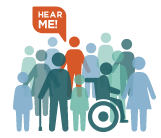Research is the process of:
(1) Asking Questions; (2) Finding Answers;
and (3) Sharing What You Learn with Others.

- How many adults with intellectual disability (ID) in the United States have mental health needs?
- How well does our health survey help adults with ID report their health needs to medical professionals?
- How well does our mental health therapy treatment help adults with ID who have anxiety, or worry a lot of the time?
- How well can we track the health and needs of individuals with ID over many years?
Research partners with and without disabilities will work together to study our questions and report our results.
Can you hear us now? (2023-2028)
| STUDY # | WHAT WE WILL DO | HOW WE WILL DO IT | TIMELINE |
|---|---|---|---|
| Study 1 | We will test and improve our clear language health survey. |
– Work with our research partners to: (i) look at past survey results; and (ii) update the survey to make it better
– Give the updated health survey to 50 adults with ID and ask them how they used the survey to report their health needs to professionals. – Give the updated health survey to 500 college students to see how the survey works across different populations of people. |
2023-2028 |
| Study 2 | We will learn more about the mental health needs of adults with intellectual disability (ID). | – Ask 400 adults with ID across the United States questions about their health and wellbeing (i.e., interviews; clear language survey)
– Ask 60 people to do a follow-up interview and study what they say about their mental health needs – Work with our research partners – including the DEEP, REEP, and Special Olympics – to include adults with ID from different races and cultures – Work with our research partners – to use both past results and new results – to find out how many adults with ID reported mental health needs |
2025-2028 |
| Study 3 | We will make a mental health therapy treatment for adults with ID, who have anxiety or worry a lot of the time. | – Look at current research on mental health therapy for adults with ID and make a treatment plan (i.e., online, small group meetings with workbooks).
– Give the research-based treatment to 15 adults with ID and ask them questions about how well it works to treat anxiety or worry – Give another type of training to 15 adults with ID and ask them the same questions about how well it works to treat anxiety – Use what we learn to teach professionals how to use the group therapy to treat their patients with ID |
2023-2028 |
| Study 4 | We will find ways to track the health and needs of adults with intellectual disability (ID) over time.
|
– Make a long-term plan with project partners to get health and community living information from individuals with ID across their life. | 2023-2028 |


